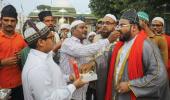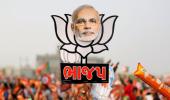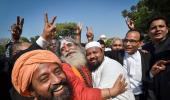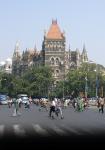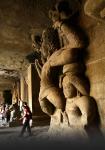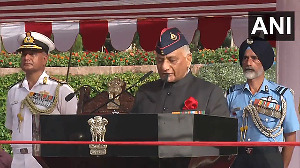'You can presume that Modi and his party will now focus on the economy.'
'But then, there is the Jharkhand election next month, Delhi soon thereafter and so on.'
'And this isn't a political leadership that takes even a panchayat election lightly,' notes Shekhar Gupta.

Even the most incorrigible critics of Prime Minister Narendra Damodardas Modi would struggle to find fault with his short and sweet address to the nation after the Ayodhya judgment.
It had three strands.
One, that the Supreme Court had settled a festering, divisive issue and now there was time to move on, forgetting the 'fear, bitterness and negativity' of the past.
Second, that the date, November 9, was particularly significant, as it was the anniversary (30th, actually) of the fall of the Berlin Wall that divided the world during the Cold War.
He invoked this Berlin Wall comparison not necessarily for Ayodhya, but the opening of the Kartarpur Sahib corridor where he acknowledged that both India and Pakistan had worked together, forgetting their differences.
And third, he said, the Supreme Court had already ordered that the Ram temple could be built.
It was therefore an obligation on the part of all citizens to dedicate themselves to the larger task of nation-building.
He invoked 'unity in diversity' repeatedly (vividhta mein ekta), and concluded with greetings for Eid-ul Milad.
So far so good.
Then we move to the political meaning of what he said.
His third point, 'Temple done, now is the time for nation-building', is what indicates the next steps in his government and party's politics.
Also, some important questions.
He swept the 2019 election with a combination of welfarism turbo-charged by Hindu nationalism.
With Article 370 and the Ram Mandir done, and some moves towards a Universal Civil Code (banning triple talaq) made, what is left of that agenda?
Within less than six months of beginning its second term, the Modi government and BJP have done almost everything they have been promising on their Hindu and nationalist agenda for decades.
Where do they go next?
Modi won 2014 on the promise of 'achche din', minimum government-maximum governance, growth and jobs.
Most of that hasn't happened.
If anything, the economic and employment situation has greatly deteriorated for the past three years.
In 2019, Hindu nationalism plus direct benefit transfers to crores of poor enabled him to persuade enough voters to look beyond the economic distress to win a second mandate.
What does he do next?
In a more perfect world, his government would need to normalise and relax restrictions in Kashmir, at some point de-escalate with Pakistan and there isn't another foreign adversary to get people angry with.
Some bit of economic nationalism, possibly directed at Chinese imports, could be useful.
But it can't have anywhere near the same oomph as demolishing a mosque, building a temple, bombing Balakot, surgical strikes and so on.
Modi has employed his foreign visits and interactions brilliantly to enhance his political stature and convince his voters that he's seen by global leaders in a league several notches above any other Indian leader they can remember.
He is too smart not to know that this would be unsustainable unless India's economy breaks out of a stall that's looking chronic now.
Therefore, November 9, 2019, is also significant for our domestic politics.
Because this is when voters would expect Modi to focus back on their economic well-being, redeem his old pledge of 'achche din'.
Of course, if you do not have grand new ideas or imagination to break out of the slide, you could explore more options to fire emotional populism: The other religious sites, NRC, and Pakistan is always next door.
But, as the disappointments of Maharashtra and even Haryana show, voters are a bit bored with the same Hindu-nationalist potion now.
The BJP performed way below expectations in both states although the vote took place within 11 weeks of the action on Article 370.
You can take an optimistic view and presume that Modi and his party will now focus on the economy.
But then, there is the Jharkhand election next month, Delhi soon thereafter and so on.
And this isn't a political leadership that takes even a panchayat election lightly.
By special arrangement with The Print


